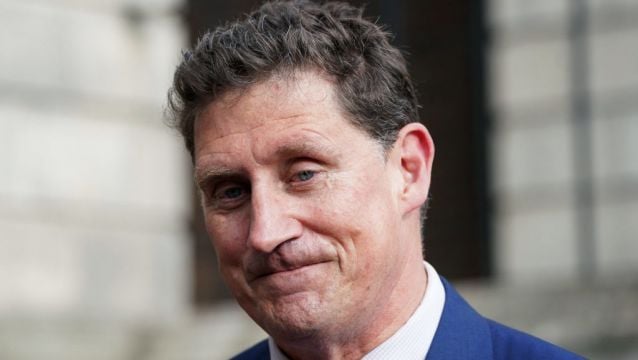Environment Minister Eamon Ryan has warned that the energy crisis will last two years.
The Green Party leader said he is confident that EU countries will reach agreement on implementing new measures in a bid to reduce soaring energy prices but warned it will not cushion the entire blow for households.
Mr Ryan made the comments as he arrived for a meeting of EU energy ministers in Brussels on Friday morning.
They met in an attempt to approve the implementation of emergency windfall levies on energy companies.
He said: “As we turn to other supplies (of gas) rather than Russian supplies, there will be a moderating impact on the price.
“But, in the last number of months, we’ve realised this is going to be a two-year challenge, not a one-year one.
“It’s not one winter we have to fight for – we have to think about how we provide and protect next winter as well.
“That should influence the approach we take so that we have reserves, and that’s why unity is important.
“We’ve to stay united for two years to get through in all likelihood. Please God it will be sooner, please God that war will come to an end sooner, but we can’t be certain of that and, therefore, we have to prepare for a more medium-term approach.”
Mr Ryan described the European Commission’s proposals as “good ones”.
“They allow us to address some of the excess profits going to the energy industries and to bring it back to help our people,” he said.
“Each country has slightly different circumstances but that broad principle… that the unfair profits caused by a war, not by any action of any companies, do have to be brought back in to help people with bills.
“I believe the Commission text does that.”
Good news. An extraordinary meeting of the EU energy council has agreed measures which will allow us redirect some of the windfall gains in the gas & electricity markets to Irish households and businesses. We are also being asked to agree ways to cut peak hour demand. #Solidarity pic.twitter.com/VJXbCrAScr
Advertisement— Eamon Ryan (@EamonRyan) September 30, 2022
However, the Dublin Bay South TD said the EU “cannot cushion the entire blow” of rising energy prices.
“There will still be a higher cost; even if a large amount of these windfall gains are recycled, that still leaves a pretty high price.
“So we have to be energy-efficient – but we have to help our people too, and businesses.”
Mr Ryan also said Europe would have to co-ordinate more closely with both gas-exporting countries and gas-consuming countries.
“We also have to work internationally,” he said.
“We have to work with some of the supply countries – Norway, UK, America.
“We have to work with other major consuming countries like Japan, Korea, because we are in the LNG market.”
Earlier, Mr Ryan told RTE that an EU windfall tax on energy companies could generate up to two billion euro for Ireland.
He said the text had been agreed and that the measures will be useful for Ireland.
Im in Brussels today at emergency EU Energy Council. We will agree two things.
1. A windfall levy on fossil fuel producers.
2. Structural reform of electricity market to limit profit on generators who’s costs have not gone up. pic.twitter.com/qGlo3ITs3S— Eamon Ryan (@EamonRyan) September 30, 2022
“Our officials here in my department have been working at length with the Commission,” Mr Ryan told RTÉ Radio 1’s Morning Ireland programme.
“We’ve a good text now, we’ve a good mechanism which will allow us to identify some of the windfall gains that are going to energy companies and to be able to bring them back to help Irish households and businesses to add to what was done in the Budget earlier this week.
“I expect we will get agreement, it will be useful for Ireland,” he added.
Asked how much it would raise for Ireland, the Green Party leader replied: “One to €2 billion, sort of, is the expectation of what we should expect.
“But that depends on so many different factors – you can’t exactly be clear, but it’s that sort of amount of money.”
On Tuesday, the Government announced €600 worth of energy credits for households as part of its €11 billion Budget measures.
The €200 credits will be paid in three instalments over the coming months.
But the Government stopped short of introducing a cap on energy prices to bring certainty to customers over their bills, despite mounting pressure from the Opposition.
France, Austria, Italy, the Netherlands, Denmark, Poland, Slovakia and the Czech Republic are among a number of EU countries who have introduced an energy price cap.
EU countries are prepared for the winter season ahead.
Gas storage facilities across the EU are already filled at almost 90% of their capacity.
👉 This will help gas supply for the cold months. #EnergySecurity #EnergyPrices #TTE— EU Council (@EUCouncil) September 30, 2022
Mr Ryan said his German counterpart had told him they have not yet made a decision on a price cap.
“They haven’t actually decided on a price cap,” he said. “They may do some mechanism, but they’re working on that and they haven’t concluded.
“Like ourselves, they are also adapting and evolving their position and we will continue to do that.”
Mr Ryan described the scale of the intervention in the Budget earlier this week as “significant”.
But he said they will have to “continue to review the measures”.
“What we’ve agreed and said is we will look and see how they work to get through this winter period.
“Particularly those on very difficult situations within the social welfare system, there is mechanisms where they can go to the Social Welfare Service to look for additional supports.
“We don’t want anyone going cold or through real acute fuel poverty this winter.”







